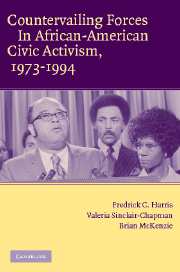Book contents
- Frontmatter
- Contents
- List of Figures and Tables
- Acknowledgments
- 1 Introduction
- 2 Good Times and Bad: Trends in the Economic, Social, and Political Conditions of African Americans in the Post–Civil Rights Era
- 3 Studying Group Activism: Toward a Macro Approach to Black Civic Participation
- 4 Echoes of Black Civic Activism: Historical Foundations and Longitudinal Considerations
- 5 Shifting Forces: Modeling Changes in Post–Civil Rights Black Activism
- 6 From Margin to Center: Bringing Structural Forces into Focus in the Analysis of Black Activism
- Appendix A Question Wording and Coding
- Appendix B Variable Sources and Descriptions
- Appendix C Time Series Models
- References
- Index
6 - From Margin to Center: Bringing Structural Forces into Focus in the Analysis of Black Activism
Published online by Cambridge University Press: 15 December 2009
- Frontmatter
- Contents
- List of Figures and Tables
- Acknowledgments
- 1 Introduction
- 2 Good Times and Bad: Trends in the Economic, Social, and Political Conditions of African Americans in the Post–Civil Rights Era
- 3 Studying Group Activism: Toward a Macro Approach to Black Civic Participation
- 4 Echoes of Black Civic Activism: Historical Foundations and Longitudinal Considerations
- 5 Shifting Forces: Modeling Changes in Post–Civil Rights Black Activism
- 6 From Margin to Center: Bringing Structural Forces into Focus in the Analysis of Black Activism
- Appendix A Question Wording and Coding
- Appendix B Variable Sources and Descriptions
- Appendix C Time Series Models
- References
- Index
Summary
A community is democratic only when the humblest and weakest person can enjoy the highest civil, economic, and social rights that the biggest and most powerful possess.
A. Philip RandolphOur findings in this study pose a question that is at the heart of the debate about the state of black political life at the turn of the twenty-first century – can black political equality be accomplished without economic equality? We assess the state of political equality for African Americans since the civil rights movement by exploring how two competing forces – black political empowerment and social and economic distress – influence civic participation in black communities. Exploring fluctuations in black activism over the course of the first two and a half decades after the 1960s civil rights revolution, our study demonstrates that black civic life has exhibited a tug-of-war between the empowering effects of black office-holding on the one hand and the stagnating effects of social and economic distress on the other. The primacy of distress in the tug-of-war between empowerment and economic factors is an unanticipated outcome from the civil rights movement's focus on the guarantee of formal political rights in the transition from protest to the promise of blacks' equal access in mainstream political life.
The movement and the landmark legal reforms that emerged in response to mass action altered the American political landscape by opening opportunities for blacks to have their voices heard equally as civic actors in mainstream political life.
- Type
- Chapter
- Information
- Publisher: Cambridge University PressPrint publication year: 2005



